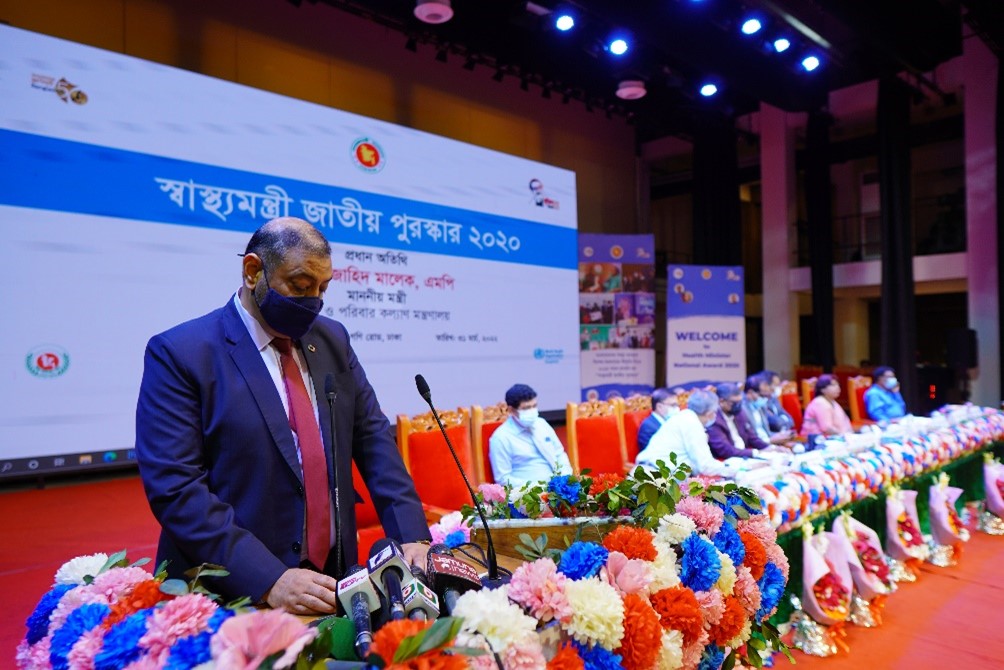Ministry of Health and Family Welfare (MOHFW), Government of Bangladesh, in association with World Health Organization, has organized an event at Osmani Memorial Auditorium, Dhaka on 31 March 2022. During this event 47 public health facilities from all tiers of the public health system in the country received Health Minister’s National Award 2020, to recognize and promote best practices in the Bangladesh health system. Health Minister’s National Award is an initiative of the Management Information System (MIS) unit from the Directorate General of Health Services (DGHS).

WHO played pivotal role in supporting MOHFW to assess performance of all public health facilities across the country. Best performing health facilities were awarded by Honorable Health Minister, Mr Zahid Maleque MP.
The main goal of the performance assessment is to build a resilient health system in Bangladesh, by implementing healthy competition among peers to improve their performance in service delivery and facility management.
The system enabled a virtuous competition and continuous monitoring of health facility’s performance. This initiative also contributes to enhancing good governance, as it allows the monitoring of the investments made in the national public health system.
The assessment measures the readiness of health facility for delivering quality essential health services, including Infection Prevention and Control (IPC) measures in place, cleanliness, Human Resource capabilities, placement of appropriate display boards and patient guidance signs, adequacy of laboratory services, waste management, and other governance related measures. Patient satisfaction with the quality of services was also assessed through inpatient and outpatient survey by team of assessors. Through this initiative performances of health facilities and health offices at different tiers of the system are measured, scored, ranked, and, finally, the best ones are recognized.
A comparative analysis of the results of health facilities that were consistently assessed from 2017 to 2019 demonstrated a sharp increase in the utilization of healthcare services across all facility levels. A recognition from highest level encouraged health managers to perform at their highest capacity.
“A great incentive to participate in this performance evaluation initiative is the Health Minister’s National Award, awarded to the best performing health facilities and the health managers”. Said Dr. Bardan Jung Rana, WHO representative to Bangladesh during the ceremony. The MOHFW considers introducing incentives at individual levels for best performers.
“Currently the COVID-19 pandemic shows decline in positivity rate and cases, but we should not be complacent and should not think COVID-19 pandemic is over. COVID-19 shows us, without any doubt, that we must further continue the efforts to strengthen health systems preparedness and readiness, early containment measures, rapid responses, alert, and surveillance systems.” Said Dr. Bardan Jung Rana, WHO representative to Bangladesh.
All these are critical to contain the epidemic and ensure continuity of essential health services, to revitalize momentum towards Universal Health Coverage, and to achieve the Sustainable Development Goals (SDGs). WHO is committed to provide continued support to the government in this endeavor.
Launched in 2014, each year the tools for assessment are modified to the need of health development and in 2021 new performance indicators were added to capture the status of essential health services which is disrupted due to COVID-19 pandemic.
The initiative progressively evolved making use of internet technologies, and an online system for measuring and scoring is now publicly accessible through a real-time dashboard.
“Compared to other years, 2021 has been a very challenging year particularly for all the frontline health workers. On behalf of WHO, I would like to thank the health workers for your dedication and hard work in responding to COVID-19 and also for maintaining the continuity in the delivery of essential health services.” Dr. Rana concluded.
“Bangladesh has made great success in tackling the COVID-19 situation with support all kind health care providers, policy makers and professionals. Bangladesh is making commendable progress in achieving the target for COVID-19 vaccination in the region.” Said Honorable Health Minister, Mr Zahid Maleque MP. He added “We should consider awards for nursing staff and medical technologist for their contribution in health services.”
There was a pre-award ceremony workshop conducted by MIS to present findings of health facilities assessment where technical officers from WHO presented the analytical findings of this assessment. The event was participated by Divisional Directors and Civil Surgeons across the country.
WHO is committed to working with the MOHFW and development partners to support this initiative for improving the quality of health care services in Bangladesh, to recognize and promote best practices within the health system through peer-learning and creating competitive environment.
